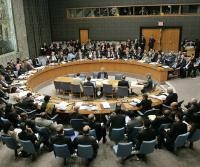September is the showcase month at the U.N. headquarters in New York. In 2009, in addition to rolling out the red carpet for newly elected leaders from the U.S. and Japan, the organization also made ambitious attempts to address climate change and nuclear nonproliferation. Compared to past years, expectations were sky high, as President Barack Obama delivered a speech detailing his administration's commitment to multilateralism after years of U.S. neglect. With Washington's full backing, the U.N. seems ripe for an image makeover to accompany the structural facelift currently in progress. However, despite the optimism, no one is forecasting any progress on one recurring U.N. headache: reform of the Security Council.
Since the U.N.'s creation in 1945, the Security Council has been the organization's central decision-making body, responsible for maintaining international peace and security. And for almost the past 20 years, countries have been lobbying to reform the Council to make it more reflective of the current balance of power. Every year, countless hours are spent on a never-ending carousel of fruitless negotiations, and 2009 promises to be no different.
Today's Security Council presents no shortage of shortcomings. Almost everyone agrees that it's anachronistic. The U.N. has added dozens of countries since 1945 to reach its current total membership of 192. Yet six decades later, the same five countries -- the U.S., U.K., France, China, and Russia -- still hold onto most of the power. During most of the Cold War, these five veto-holding permanent members of the Council justified their special status by the prestige and gravitas that came of being the world's only possessors of nuclear weapons. But since the fall of the Soviet Union and the spread of nuclear weapons to India, Pakistan, and Israel, that flimsy rationale no longer holds up under scrutiny.

